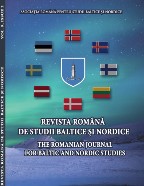On semantic and semiotic multilingualism in earlier and latest works of Sabira Ståhlberg and Tzveta Sofronieva
On semantic and semiotic multilingualism in earlier and latest works of Sabira Ståhlberg and Tzveta Sofronieva
Author(s): Johanna DomokosSubject(s): Language studies, Language and Literature Studies, Literary Texts, Poetry, Studies of Literature, Philology
Published by: Asociatia Romana pentru Studii Baltice si Nordice
Keywords: multilingualism; code-switching, multiverse; zero code-switching (ZCS); 1st -5th degree code-switching (CS1-CS5); ecological literature; Anthropocene;
Summary/Abstract: The present study describes the poetics of two contemporary multilingual writers, one born in Finland (Sabira Ståhlberg) and one in Bulgaria (Tzveta Sofronieva). Besides being prolific writers in literary genres such as poetry, prose, drama, both also translate and edit world literature. Early in their career each of them achieved a PhD. Sofronieva and Ståhlberg carry out academic activities through their research studies. After visiting a multitude of places, they have become not only literary figures of both their birth countries’ literature and the literatures of several other countries, but real literary citizens of the ‘new’ world literature (McDougall, 2014). Their philosophical and ecological aestheticism voices the most urgent problems of humanity by incorporating the latest insights of brain studies, quantum physics, psychology, migration and cultural studies. Their oeuvre addresses any reader irrespective of language(s), background(s), and location(s). After looking into the monolingually multilingual (using hidden code-switching) as well as multigraphic and multilingual (using overt code switching) artistic production of Sofronieva and Ståhlberg, this study compares two poems, one by each of them, sharing the common metaphor of the sea horse. The aim of this comparative study is to point out how their highly topical poetries activate the multilinguality of any reader, as well as how the linguistic, alphabetic code-switching and shifts of interpretation paradigms loosen formal and conceptual borders. By their act, the reader is empowered to take part in not only piecing together but creating a better ‘new’ world.
Journal: Revista Română de Studii Baltice şi Nordice
- Issue Year: 13/2021
- Issue No: 1
- Page Range: 29-46
- Page Count: 18
- Language: English, Romanian

